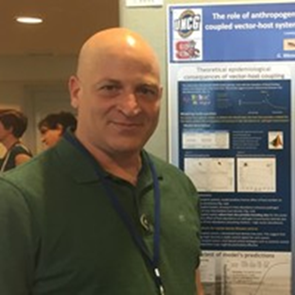
Establishment of an infectious disease in a population requires more than just introduction of a pathogen into the population. It involves a complex interaction between the disease agent, the host, sometimes vector, and their environment. Understanding the ecological processes that determine the distribution, dynamics, severity, and evolution of diseases is the domain of the new science of Disease Ecology of Infectious Diseases. The central theme of my research program is that the application of an ecological approach is crucial for understanding the processes by which anthropogenic environmental change leads to the emergence of zoonotic diseases. It is also crucial for identifying and targeting weak links in the transmission chain of such pathogens. My research approach combines empirical research involving field and laboratory work as well as theoretical work involving mathematical modeling, individual-based simulations, and conceptual models.
Our lab’s recent discovery of the pathogen Orientia in NC chiggers was published by Emerging Infectious Diseases and featured in […]
Posted on October 20, 2023
On October 20, 2022, Dr. Reuben Garshong defended his dissertation, “The role of topographic corridors and small rodents in Lyme […]
Posted on November 22, 2022
On August 31st, 2022, Dr. Wasserberg presented a seminar on, “Ecological perspective provides insights for understanding and controlling vector-borne and […]
Posted on November 22, 2022